
02 Nov 2023
Linda’s remarkable story of recovery from AML
When Linda Sellar’s mother was diagnosed with dementia in early 2014, Linda read that B12 was an indicator of possible future dementia – so she asked her GP for a test. Results showed that her B12 was normal, but her neutrophils were found to be low; hovering between 0.8 and 1.2 (normal level should be 2.5 – 7). But Linda continued to be symptom-free – until April 2019.
“I was probably the least likely to catch colds or minor illnesses in the family,” said Linda, a former civil servant and mother of three who lives on the outskirts of Plymouth with Kevin, her husband of 30 years. “But in April 2019 I noticed slight breathlessness when walking up hill, which I put down to a lack of fitness – as my husband had a knee replacement in December 2018 so we hadn’t done much walking. In an effort to improve my stamina, I walked more and attended the gym.
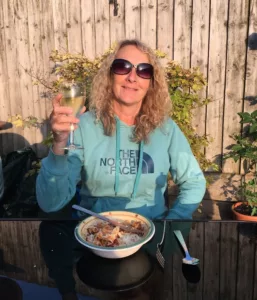 “Then in early June 2019, I lost my voice with no obvious symptoms, which was then immediately followed by a dry, irritable cough. My husband insisted I should book a GP appointment, but when it came around a week later the cough had gone and I nearly didn’t attend. Luckily, my very vigilant GP requested blood tests because of my low neutrophil record. Two days after the blood test my GP called to say my haemoglobin level was 79 (it should have been between 120 and 160) and I should be feeling terrible – but I felt fine. She followed up with a further blood test, as she said it could have been hormonal due to my age.
“Then in early June 2019, I lost my voice with no obvious symptoms, which was then immediately followed by a dry, irritable cough. My husband insisted I should book a GP appointment, but when it came around a week later the cough had gone and I nearly didn’t attend. Luckily, my very vigilant GP requested blood tests because of my low neutrophil record. Two days after the blood test my GP called to say my haemoglobin level was 79 (it should have been between 120 and 160) and I should be feeling terrible – but I felt fine. She followed up with a further blood test, as she said it could have been hormonal due to my age.
“Two days after that she called to say my haemoglobin was lower again, so she referred me to haematology at Derriford Hospital. The haematologist recommended a bone marrow biopsy, but as I wanted to delay this until after my holiday in France, he gave me two units of blood. At this point nobody thought it was anything too serious as I was still feeling well. I thought my low levels could be affected by alcohol consumption so had a very dry French holiday!”
Linda’s bone marrow biopsy was carried on our 24th July 2019. She and her husband were due to go away on a caravan trip two days later, but plans were about to change.
“The consultant phoned and asked me to go straight to Derriford Hospital. I tried to delay that until after our caravan trip, but was told I needed to come in immediately and bring somebody with me. As the room was full with consultants and an oncology nurse I guessed the news wasn’t going to be good.”
One 26th July 2019, at the age of 60, Linda was diagnosed with acute myeloid leukaemia (AML). She was told treatment needed to start in the next few days.
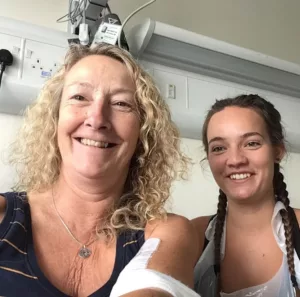 “I was admitted on 31st July, a PICC line was fitted and my first five-day chemotherapy treatment started the next day. I felt generally nauseous and lost about 5kgs in weight during what was eventually five weeks of inpatient treatment. Thankfully, due to anti-nausea meds and very attentive nurses, I did not suffer from vomiting. I have a bit of a phobia about it and it was the one thing that really concerned me about chemo. Also luckily I didn’t lose my hair. I was allowed home on 7th September and began to feel like my old self again.”
“I was admitted on 31st July, a PICC line was fitted and my first five-day chemotherapy treatment started the next day. I felt generally nauseous and lost about 5kgs in weight during what was eventually five weeks of inpatient treatment. Thankfully, due to anti-nausea meds and very attentive nurses, I did not suffer from vomiting. I have a bit of a phobia about it and it was the one thing that really concerned me about chemo. Also luckily I didn’t lose my hair. I was allowed home on 7th September and began to feel like my old self again.”
However, a bone marrow biopsy a few days later showed Linda would need more chemotherapy using a different drug. After this second treatment she had to be readmitted as she’d developed a neutropenic fever, but a further bone marrow biopsy on 21st October showed the welcome news she was in remission. Another round of chemotherapy was undertaken in November as planned.
“I was doing really well until I developed a high fever. Lots of investigations were undertaken which pointed to a fungal lung infection. I felt a lot better once the drug treatment kicked in and my temperature went down, but I had to stay as an in-patient because the drugs could have caused kidney damage, and I needed regular intravenous fluid.
“Scans were concerning as they showed the infection not clearing, which caused delay with my planned January 2020 stem cell transplant. At one point it was thought I might need surgery to cut out the damaged part of my lung.
“Luckily I was allowed home between Christmas Eve and New Year’s Eve, and it was lovely to wake up with the family on Christmas morning. We travelled back to the hospital later on that morning and I had a two-hour infusion, but it was actually good fun, eating chocolates and mince pies.”
Linda was eventually diagnosed with the lung infection aspergillosis and started on a new drug regime. Her stem cell transplant was delayed until the end of March.
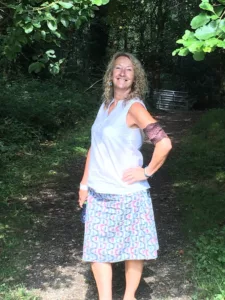 “Only one donor was found on the national register, and it was agreed that I would receive frozen cells as she lived in the USA. But on 3rd March, I was given the devastating news that donor was no longer available. My biological children were tested for donor suitability, and my son Jack was deemed to be most suitable. I did question why the transplant was necessary when I felt well, but was quite brutally told that I was at serious risk of relapse.
“Only one donor was found on the national register, and it was agreed that I would receive frozen cells as she lived in the USA. But on 3rd March, I was given the devastating news that donor was no longer available. My biological children were tested for donor suitability, and my son Jack was deemed to be most suitable. I did question why the transplant was necessary when I felt well, but was quite brutally told that I was at serious risk of relapse.
“Jack is very slight, and it took him two eight-hour days in hospital to extract enough cells. He has been diagnosed with autism and is a very anxious person, so it took a lot of bravery for him to go through the whole process, which also involved several days of cell boosting injections.”
Linda eventually had her stem cell transplant on 13th and 14th May 2020, with five days of chemotherapy and total body irradiation beforehand to prepare.
“All the staff on the haematology and stem cell transplant ward were amazing. They all helped me feel comfortable and at ease.
“My husband set me an exercise routine, which helped me so much in the hospital. He visited every day and brought clean clothes and foods to tempt me. I also showered, dressed and walked around my room everyday – I remember it was 11 paces from one end to the other. I had loads of visitors to keep me cheerful during the day – 13 on one day!
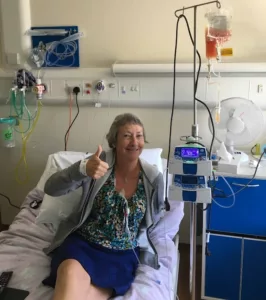
“My sister visited for six weeks from New Zealand and we watched the rugby world cup games together. I was fortunate that the period when I was not allowed visitors because of Covid was for my stem cell transplant, so they wouldn’t have been allowed in anyway. I was in a ward with 5 other ladies for company. And thanks to the generous gift of an iPad from my Aunt I was able to join on-line quizzes with friends and family. I had an adult colouring book and danced to tunes on the radio. I did watch lots of TV, but tried to restrict myself to evening viewing.”
Linda was finally allowed home at the start of June 2020 with thrice weekly visits for a month, then once a month checks for a further five months. Looking back on the experience, she says a positive attitude and trying to remain physically and mentally active really helped her through.
“My husband and daughter were devastated by my diagnosis. My daughter Claire visited me in the hospital every evening after work, and the nursing staff were kind enough to let her stay well after visiting hours. My son Jack, who’s now 28 and lives with us, does not feel a lot of emotion because of his autism. He, like me, chose to treat the whole treatment period as a scientific experiment. He was nervous about the hospital and terrified of passing any infections to me. Our other son Ryan, who lives around half an hour away, arranged rental of an allotment to help Kevin have a distraction.
“Looking back, I had a relatively easy journey as I never required oxygen or admission to ICU. I hope that the fact that I remained relatively cheerful helped us all look to a positive future and outcome.”
“I have enjoyed returning to the gym, swimming, walking and making the most of my delayed retirement. I have been on two skiing trips, several cycling holidays and returned this April from a long-awaited trip to New Zealand, Australia and Singapore!”
Three years on, Linda, now 64, remains in remission and is embracing life to the full. But she is keen to spread the message about getting symptoms checked.
“I can now recognize that my breathlessness was a symptom and am so grateful that my husband insisted on my visit to the GP. I was also lucky that my GP was vigilant. I would urge anyone who has symptoms to visit their GP and insist on blood tests, even if the GP does not consider it necessary.
“I would not be here today without the marvellous medical treatments available to cure my AML and also the subsequent fungal lung infection. All this is available to people like me thanks to research and funding provided by Leukaemia UK.
Speaking of the importance of joining the DKMS stem cell register, Linda said: “It would be great if all our younger relatives could join for future sufferers. I had only one suitable match, but some people have none. The more people on the register, the better chance of a match.”
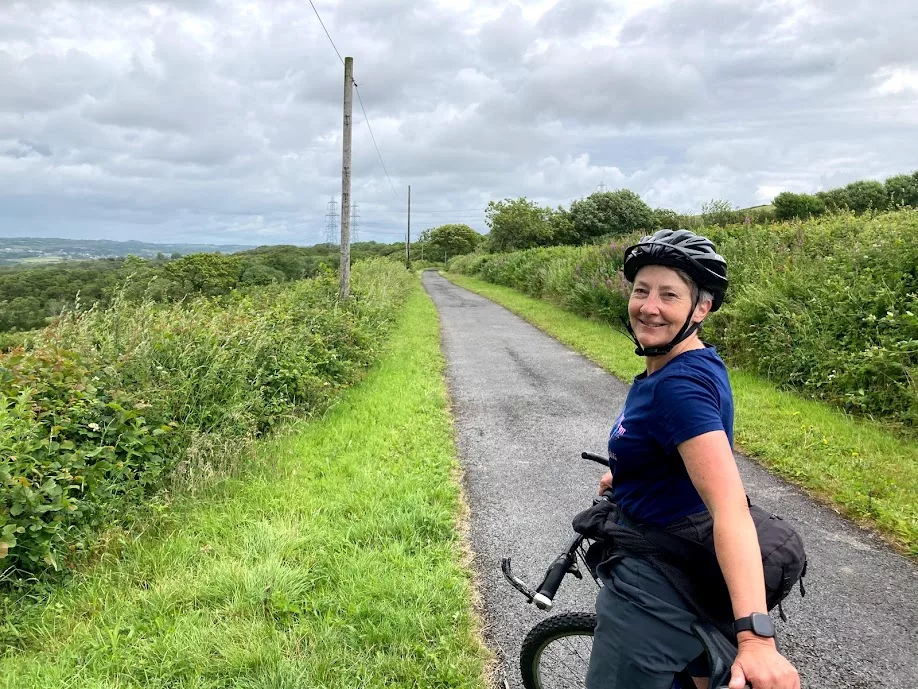
Want to read more about others who have been diagnosed with leukaemia? Read Sinead’s story about her diagnosis.
Related posts
19 August 2022
Leukaemia Care and Leukaemia UK announce financial support collaboration
Leukaemia Care and Leukaemia UK are pleased to announce a collaboration to provide financial support to people affected by leukaemia, through the financial hardship fund. Leukaemia Care have provided 364…
11 January 2019
Leukaemia UK and Leuka have merged
We are delighted to announce that on 1 November Leuka and Leukaemia UK merged
16 November 2023
Leukaemia UK appoints Hannah Peckham as newest Ambassador
Leukaemia UK has today announced its appointment of award-winning children’s book author, Hannah Peckham, as its newest celebrity Ambassador. Hannah joins the likes of actor Dougray Scott, celebrity chef Francesco…
30 March 2022
One Cancer Voice 10-Year Cancer Plan Consensus Statement
We have joined with 53 cancer charities to speak with One Cancer Voice and publish 10 tests that the Government’s new 10-year Cancer Plan must meet if it is to be successful.